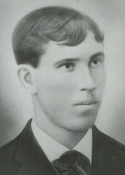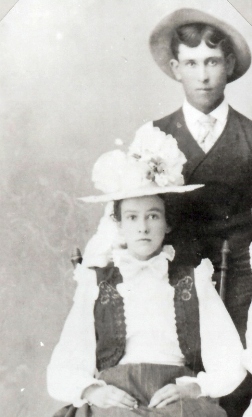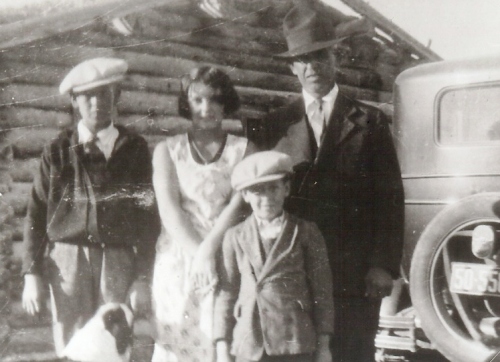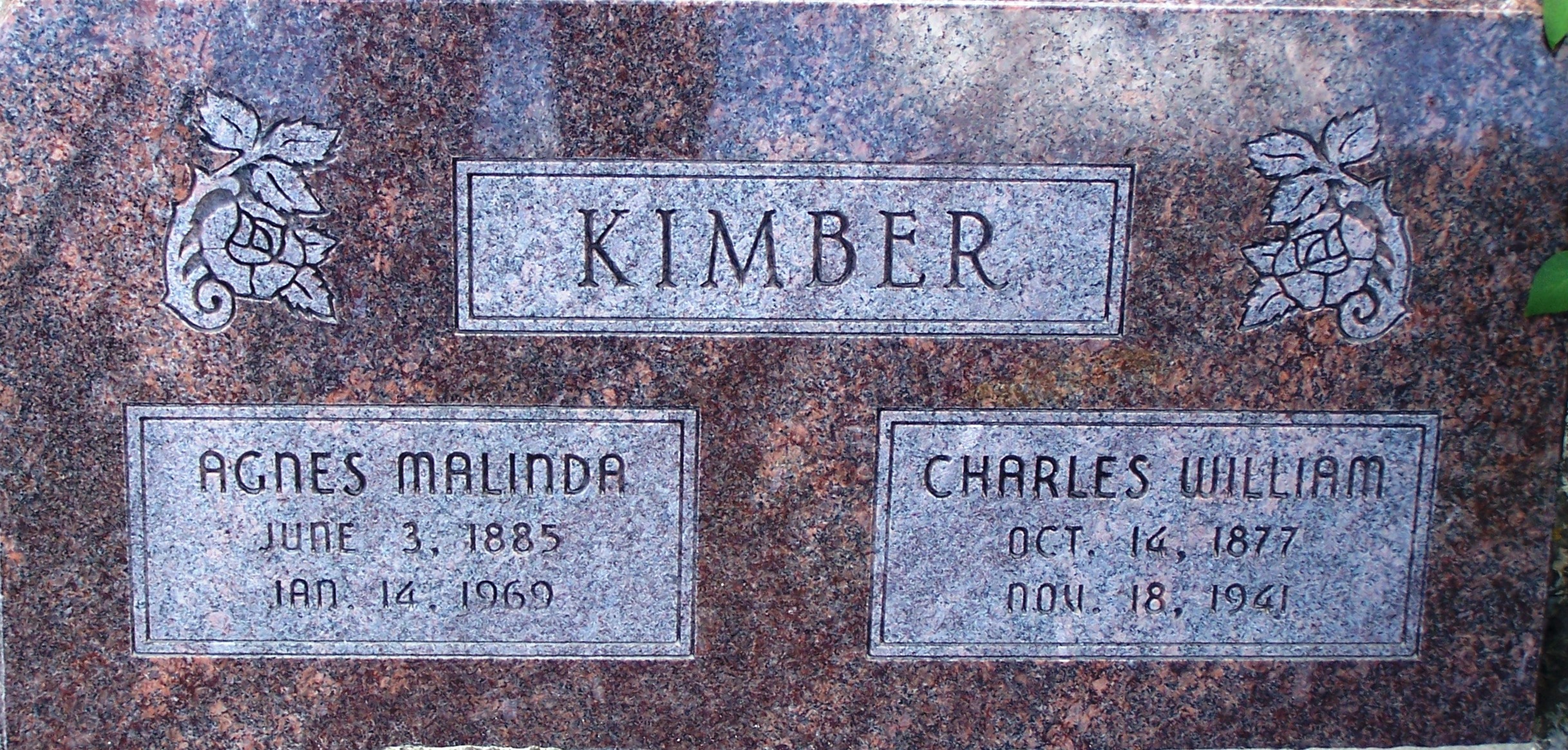 Charles William Kimber was born on October 14, 1877, at Grouse Creek, Box Elder County, Utah, the oldest son and second child of Charles Kimber and Sarah Elizabeth Morgan. He was the first white child born in Grouse Creek Valley. He was blessed on March 18, 1878, by Benjamin F. Cooke. He was baptized on May 23, 1886, by William P. Paskett and confirmed on May 23, 1886, by Charles Kimber Sr.
Charles William Kimber was born on October 14, 1877, at Grouse Creek, Box Elder County, Utah, the oldest son and second child of Charles Kimber and Sarah Elizabeth Morgan. He was the first white child born in Grouse Creek Valley. He was blessed on March 18, 1878, by Benjamin F. Cooke. He was baptized on May 23, 1886, by William P. Paskett and confirmed on May 23, 1886, by Charles Kimber Sr.
His childhood was that of a typical pioneer boy. According to his sister, Ann, he and she became regular playmates of little Indian children, whose families were friendly with the white settlers. Typical of many of their experiences was the time they found the baby wild cats on the hillside and carried them home. Such pets did not appeal to their mother, however, and so they were made to carry them back to where they had found them.
His sister, Ann, also told about an incident which occurred when they lived on the big Kimber Ranch below Grouse Creek, then belonging to Charles Kimber Sr. Ann and Billy loved to wander over the surrounding hillside, and many times were gone for hours at a time, often causing considerable alarm at home.
Their mother, fearing any number of things when they were gone for so long, cautioned them many times to stay closer to the ranch and within calling distance. Finally, she told them that if they strayed too far, the devil might get them, but their next little journey covered the usual amount of time and territory. Finally, they turned their steps toward the dirt road on the flats that would lead them home. Trudging along, they suddenly spied an object all dressed in black coming down the road toward them. The “object” seemed intent on getting to them. Frightened and conscience stricken, they remembered their mother’s warning about the devil. How the dust must have flown as they left the beaten dirt road and struck out in all haste back over the hills to home! Their mother was unusually calm and composed when they related their frightful experience to her, but as she put away the black clothes, she must have smiled broadly to herself and thought that at last the lesson had been learned.

Charles and Lindy Kimber
From his childhood on, “Billy,” as he was called, was sober and quiet by nature, a trait which undoubtedly became more prominent upon the death of his mother, which occurred on October 26, 1892. When he was about fifteen years old, she died of childbirth at the age of thirty-five, having given birth to nine children. Billy had been very fond of his mother, although after her death, he seldom, if ever, talked of her, and would never respond to questions concerning her. Even in his adult years this was true. Old-timers used to remark how he could be seen often with his mother, helping to irrigate the grain or potatoes or doing other necessary chores with her when his father was busy with other things.
There must have been many experiences such as these which they shared, since the oldest son of any pioneer family usually had responsibilities greater than those of the other children, and certainly greater than the responsibilities which we of later generations are required to assume before adulthood.
It was said that before his mother’s death, Billy was easy to handle, willing to obey and slow to temper. Afterward, undoubtedly feeling a forced dependence upon himself, he often defended himself strongly against discipline, criticism, or rebuke. Even then, however, he often manifested genuine appreciation for any small consideration shown him, never complaining of the overalls or shoes his father bought for him were not the right fit or kind he would have liked to have.
On June 16, 1893, his father married again, this time to Persis Josephine Laird, who had been born in Goshen, Utah. For a short time, Billy’s family moved to and lived inHuntington, Utah, then returned again to Grouse Creek. His father’s second family continued to increase in number, and Billy became more and more an unfamiliar figure in his father’s household.

Myron Kimber, Midred Toyn. Russell Kimber & Charles William Kimber
In those early years of Grouse Creek history, many wild horses roamed the miles and miles of hill and valley territory extending Westward to Death Valley and Delno, Nevadaand even beyond. So it was only natural that “horse outfits” be organized regularly. The cowboys would spend weeks at a time “rounding up” the wild horses, which were then taken to the railroad and shipped by train to market as far East as Chicago, but oftener to Ogden, Utah and closer markets. Young Billy became one of these cowboys. When he was young as thirteen, he went on several outfits with his father. But after his mother’s death and his father’s second marriage, cowboying became almost his whole life.
He learned very early the hard work attached to it, assembling the “grub,” bed rolls, saddle packs, the mile after mile of riding, sleeping every night on the ground in all kinds of weather, sometimes in wet saddle blankets, cooking in dutch ovens over campfires, biting the dust that flew when horse began to chase horse.
He became very adept in the use of the cowboy’s best tool, the lasso rope. None could out throw him. A cowboy who could throw a forty-foot rope was considered very good, but Billy could throw one ten or fifteen feet farther than his closest competitor. Small wonder, either, that while really young, regrettable, though perhaps under the circumstances, forgivable, he began smoking with the other cowboys. He probably accepted it as part of his cowboy life.
There’s something thrilling about being a cowboy in spite of the stress and strain of the work. Billy’s love for the outdoors and animals, horses, in particular, was one of his outstanding characteristics, and it was only natural that each of his five sons, who were born in later years, should inherit his same love of nature and animals. Of a truth, “you can take the boy out of the country, but you cannot take the country out of the boy.”
At one time, Billy accompanied a shipment of horses to Chicago, and while there, visited some of the big department stores, where he bought much needed clothes for himself. It must have been a wonderful experience for one so used to comparative solitude to find himself in the Big City of Chicago.
Not only did he go on horse outfits but cow outfits as well, branding in the spring, rounding up in the fall. It was on the outfits that he learned to cook, a skill which really paid off in later years when many times in his own home he helped out in times of sickness. He learned to make wonderful yeast bread, sourdough bread, and baking powder biscuits. He could cook a steak that was fit for a king. Even a kettle of beans, cooked over his fire and stirred with his spoon, was something “extra.”
Billy’s formal education was scanty indeed, although he became very good at “figures.” His religious activity was also very limited, probably because of his lengthy absences with the outfits. He was, however, ordained a Deacon by Charles Kimber, Sr, on June 23, 1889, and ordained a Priest by George A. Blanthorn on August 4, 1907. Later, before his Temple marriage in 1916, was ordained an Elder by David H. Toyn onNovember 17, 1915.
On March 17, 1903, he married Agnes Malinda Jones, who had moved to Grouse Creek several years before with her parents from Huntington,Utah. She had spent considerable time in the Kimber home helping “Aunt Josie.” Her sister Jane was then keeping company with Quart Catlin, who was one of Billy’s best friends, so it was quite natural that Billy should become interested in Malinda. They were married in the Kimber log home by George A. Blanthorn.
At first, they shared a log cabin at Buckskin Springs, some distance from Grouse Creek, with Quart and Jane, who were then also married. Many good times have been recalled by these couples of the period of time spent here. In spite of his quiet nature, Billy was a very good dancer and loved the country dances, the masquerades and celebrations.
At Buckskin Springs, their oldest child, Eldred was born. They then lived for a short time with Will Jones, a brother of Malinda, who lived in the old log schoolhouse above the dugway. They lived here while Billy built a two-room log cabin on a plot of ground that his father gave him, and which was a short distance from his father’s house. On the inside of the cabin Billy hewed carefully with his ax, log by log, and the young couple were happy to call it home. Three more sons, Vaughn, Evan, and Myron were born here. They later moved this home to property they began purchasing (together with his brother Elmer) from Billy’s father. The property was farther north in the Valley and Billy’s share was about sixty-four acres. The house was later added to by another room and an adjoining cellar. Russell was born here. Charles Eldred was born on January 29, 1904; Warren Vaughn was born on October 28, 1906; Evan Lamont was born on August 14, 1908; Myron George was born on January 17, 1917; and Francis Russell was born on October 27, 1921.
According to his good wife, Billy was a kind, considerate father and husband. He was never set on attaining wealth or setting himself to outdo anyone else, but was satisfied with the simple life. Although he was said to have been very determined in some of his ways and hard to reason with, who can judge harshly when realizing the unusual conditions with which he coped while approaching manhood?
His years of complete dependence upon himself, his rugged outdoor life with its hours of solitude, plus his sober nature, were probably the combined reasons which kept him at times from being very accommodating toward many of his neighbors, and indeed, from being very intimate and confidential with even the members of his own immediate family. His thoughts were his own, and he cared to share them very seldom. His sons can recall of many times riding on the range with their father for hours without as much as a dozen words falling from his lips. But having so little to say, it can and has been truthfully said that he scandalized and gossiped about no one. There’s a saying familiar to all of us that he surely must have believed in: “There’s so much good in the worst of us, and so much bad in the best of us, that it hardly behooves any of us to talk about the rest of us.”
Billy had other very good traits about him which certainly outweighed any other kind, especially in the eyes of his good wife, who was never in excellent health, but who was nevertheless a wonderful wife and mother. Especially while carrying her children, she was sick a good deal of the time. During these times and her confinements, her husband would cook the meals, do the housework, scrub the baby clothes, do the family washing and ironing just as well as any woman could have done.
Billy enjoyed a good job or humorous incident. He was a great sports lover. He was one with his boys in everything from horse shoe pitching and marbles to the boxing broadcasts. The fishing and hunting trips and jaunts for choke cherries, often shared by the whole family formed the basis for memories which should never grow dim in the minds of the five sons. Which of them could ever forget the smell of delicious rainbow trout frying in the dutch oven over their father’s fire?
A basketball or baseball game “downtown,” frequently though they occurred, were real occasions for the menfolks. There was a time when a regular Grouse Creek team was organized with Billy as one of its most valuable players because his speed in running. The team raised the funds in various ways to buy their own suits, and would accept challenges from the teams in Park Valley and Yost and other isolated towns throughout the summer seasons. It was a familiar sight to see Billy, along with the others, hauling the big water barrels by team around the old ball diamonds, sprinkling down the dust before a game was to be played. There was never a fourth or twenty fourth of July celebration which did not include a baseball game.
Even after he was physically unable to participate at all in any sports, Billy loved to go watch the games. This love of sports, like his love of nature, has manifested itself strongly in his sons and grandsons.
Billy and Lindy received their endowments and were sealed on January 12, 1916, in the Temple before either Myron or Russell were born. The three boys were sealed to them at this time also.
For a while, Billy attended his Priesthood meetings regularly with his older boys, and began to read and think about scriptures more than he had ever done before, often making notes in the margins by the scripture he read. When his wife was asked to become Ward Relief Society President, he supported her willingly, many times unhitching the team from a plow or mowing machine in order to take her to meeting.
However, for several years before 1928, Billy had already began to have definite symptoms of arthritis. In fact, Myron, born in 1917, remarked that as early as he could remember, his father was not able to stand straight nor do a hard day’s work. He began taking advice and treatment from a Dr. Robinson in Ogden, but his condition did not improve and any hard work became impossible for him. Finally, in 1928, the family decided to sell the livestock and lease the place and move to Ogden. Here they were nearer to medical advice, and the family doctor became Dr. R. L. Draper. The two older boys worked to help support the family.
During the time they lived in Ogden, Billy became severely ill with pneumonia. His condition was so critical that he was bedfast for weeks. Early in this sickness, Mr. Draper warned him against the continued use of tobacco, telling him that his lungs were so bad that he would literally kill himself if he did not forsake the habit. Convinced by the doctor, he gave up tobacco, and for a time became well again, gained weight, and felt better than he had in years. It is the opinion expressed by members of his family that had he permanently forsaken the habit he would have prolonged his life many years.
During the depression, about 1932 or 1933, on one of his extended trips back to Grouse Creek, Billy suddenly decided not to lease the place again, but to take it back himself. It was typical of him that he made this decision by himself, and although the family was reluctant to return, they could do nothing else.
The oldest son, Eldred, had married in Ogden, Vaughn and Evan also remained in Ogden, where they had employment and where they later married. Myron and Russell were the only ones who returned with their mother to the old home and their father.
Times were extremely hard for them during those depression years, with no livestock, not even chickens at first, to help out with the problem of food. It was due mainly to the resourcefulness and wise management on the part of that good mother that they were able to exist at all. Billy had returned to smoking and had immediately began to decline again in health. He eventually became so bad that the work on the place rested solely on the shoulders of his wife and two teenage sons.
There was the farm loan to pay off, too, which they had taken out to pay off his father years before, but which proved to be more of a burden than a blessing. Billy had refused to go any further in debt to buy additional cattle or make needed improvements. How that mother managed to eventually pay off the farm loan, with no more resources than she had and faced with her many problems, is in itself a story that would fill a book, but a story which will probably never be told in full.
Billy’s arthritis had returned in all its cruelty, along with the rare and terrible disease called Bantes disease. Year followed year, with complications of every kind seeming to develop. He became a helpless invalid, having to be assisted in everything and finally became bedridden, morphine given on prescription through his doctor, became an almost daily sedative to ease his suffering and bring rest. There were times during the last few months of his life when he lay for days without knowing anyone or anything, conscious only of the fact that his call of “mother” would bring his wife to his side with gentle, although temporary relief, for his pain.
Indeed, his last words were his call for her. She was a wonderful nurse, confining herself with him and denying herself the spiritual uplift to regular attendance to any of the church meetings in order to be with him should he need her.
Charles William Kimber died on November 18, 1941, at their home in Grouse Creek, and was buried on November 21, 1941 in the Grouse Creek Cemetery.

